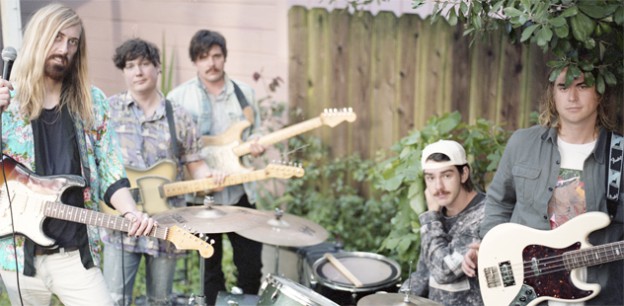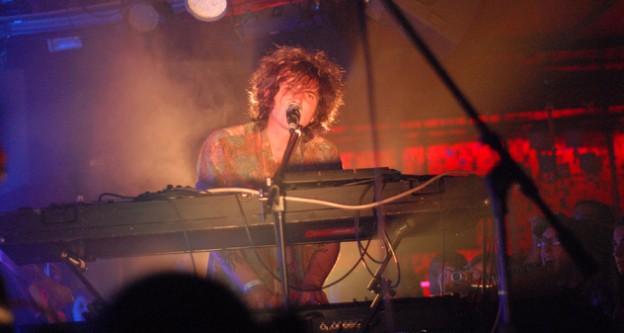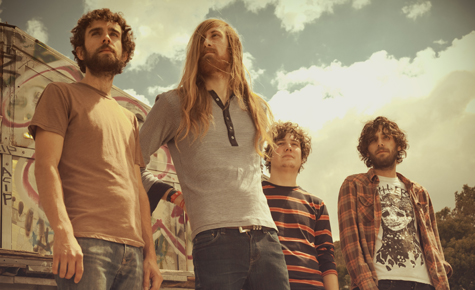Ex-Ganglians member Kyle Hoover on the first album from his new group, Tiaras
All eras are defined by the fact that, eventually, they will end. There can be no Summer of Love Without a Winter of Discontent; no Woodstock without an Altamont; no old guard without a new wave; no lo-fi renaissance without a hi-fi takeover. Tiaras, a San Francisco rock outfit forged from the remnants of other groups (Blasted Canyons, Fine Steps, Sacramento’s own Ganglians), is starting the year by releasing a full-length illustration of this principle. The self-titled debut album, out Jan. 14, 2015, is a clear step away from the modes and methods characterizing the earlier work of its musicians. Where Ganglians once stood for a wild, heat-shimmery psych pop indebted to bands of the ‘60s, Tiaras glides—not leaps—further into music history (say, about two decades), emerging into a clearer, moodier intersection of mid-‘80s jangle-pop and new wave. Whatever the eras and styles that reverberate in Tiaras’ music, a few things are clear: their melodies are strong, their production is crisp and Tiaras may be one of the first great rock albums of 2015.
To get a deeper insight into the new record and its prehistory, we dialed up guitarist Kyle Hoover, who was spending his weekend hanging out in the illustrious Haight-Ashbury neighborhood of San Francisco. When considering the changes his band has been through, I wondered beforehand: how much of a hold does the past still have on that place? Does the feverish, acid-drenched zeitgeist of yesteryear still contain a slight hold on the City by the Bay? As numerous other bands from the local scene begin to decamp for other horizons, we can tell a lot about the current landscape from the musicians who have opted to stay. The music of Tiaras, for one, seems well suited to its locale. While traversing the bittersweet highs and lows of standout track “In the Room,” you can imagine the swift changes of elevation and climate one comes across while traveling through the city: the top of a tower, the bottom of a hill; burning sunshine and bone-chilling fog crowding into a single moment.
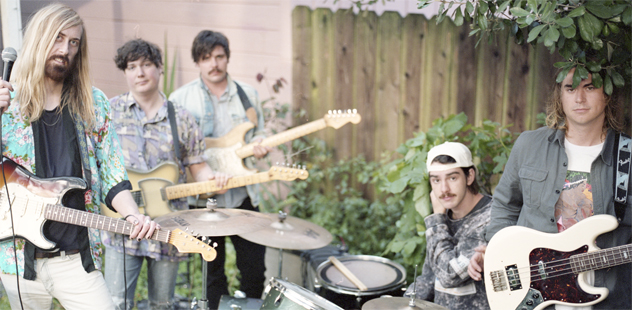
You’ve mentioned before that you’ve been living in the Excelsior area of San Francisco, how it’s fertile creative ground, but a lot of the old guard are moving south for greener pastures. What’s your point of view on these changes?
I’d say the curtains have been drawn back a little bit. I was joking around with my bandmates about the “endless summer of lo-fi ‘09.” It was this big thing—lo-fi garage, it was huge, it was everywhere. I mean, we were part of that too back in the day, but, I mean, me personally, I got over backing that stuff pretty quickly, and that’s part of the reason for the change. There’s definitely a message that we wanted to send going forward with Tiaras, like, “Alright, we live in San Francisco. We used to be kind of a garage band. Now let’s do something different.” A little more solemn, little more pop-oriented. We just wanted to do something different, and lo and behold, a year later, after the record finally comes out, there’s a bunch of other bands who are sort of shying away from that [lo-fi] scene as well.
A lot of my friends moved away—that’s just how it is. It’s super hard to live in the city. But it’s not the end of the world, there’s still cool stuff. I think if anything, it’s for the better that the garage thing has kind of faded a bit from the spotlight in San Francisco. More room to breed different genres.
The genre shift—going to the hi-fi sound, concentrating on the pop melodies—did you have anything to model yourselves on?
With this record, we definitely wanted to make it sound as good as possible. I’m a fan of using the best of both worlds—digital recording is super convenient and makes for a much less stressful recording environment; however, going analog is beneficial for different sounds. You can have the best of both worlds and get really experimental. With Ganglians, we were always trying to be hi-fi; it just always sounded lo-fi because we didn’t know what the fuck we were doing. But the idea was always to try and sound as good as possible. Genre-wise, the shifts…we just started listening to different stuff. I knew Ryan [frontman for Ganglians, Tiaras] in ‘08, and we were like, “Dude! Pet Sounds!” And the influence of that album is super evident in Ganglians. For the new record, Ryan and I were getting into a lot of weird, obscure ‘80s music, along with the rest of the world, apparently—but I guess that’s just how it goes. We just wanted to disassociate ourselves from our previous sound, which is hard because I still sound like me, and Ryan still sounds like himself. Now we have three other awesome dudes with their own take on things, and I think it works. People aren’t saying we sound like the Beach Boys anymore, so that’s fine.
When you say you all started listening to different stuff, was there anything in particular that you got excited about?
Ryan and I got really into Chrome, which was like this super weird, kind of avant-garde ‘80s rock thing. I don’t even know how to describe it. We’d heard about them from back in the day, but we started listening to them all the time. I personally started listening to a lot of Echo and the Bunnymen…just a lot of weird ‘80s stuff that I knew was good but that I’d never really taken the time to listen to. When the Cleaners from Venus record was reissued a few years ago, that was being played around our house 24/7. That was definitely a record I was super stoked about.
Was there a good deal of downtime between the dissolution of Ganglians and the recording for Tiaras?
Oh yeah, definitely. I think we stopped playing together after our last SXSW, which must have been the spring of 2011. Ryan moved to San Francisco, our drummer moved to Brooklyn, our bassist moved to Oakland and I was stuck in Elk Grove. I was living at my dad’s house for a good eight months until I finally saved up enough money to move in with Ryan in SF.
Did a lot of the ideas for the new group and album come out of that eight-month period?
That would be nice, but definitely not. That was more of like a—I don’t know, we were so worn out. I think at that point, we’d been on the road almost constantly for like a year and a half. We were starting to argue a lot, and it was kinda gnarly. So I was mostly just being miserable in Elk Grove, commuting to Davis with Alex’s [Ganglians drummer] mom every morning. That’s basically what I did. If anything was going on idea-wise during that period of time, it was with Ryan and Antonio in San Francisco while they were jamming together.
It seems collectively like you have decades of band experience—you’ve been in a lot of bands, you kind of know the drill. At this point, is it easier for you to tell when the chemistry is right, or when you’re ready to call it a day?
Yeah, I’d say so. This is probably only my third band, but this time, the songs came together easier. Ganglians was like a shitload of trial and error. That was kind of a turning period, because we were all new to what we were doing. With Tiaras, it was super easy to make things work. I’d say there was a year’s worth of time where we were learning to play with each other. And it wasn’t super natural at first, but now we all understand what we’re trying to do.
Playing TBD this past October was sort of a mini-Sacramento homecoming for you guys. How was the experience?
It was fun! It kind of felt like a Sacramento Burning Man or something. Everyone was walking around with scarves on their face and dust was everywhere. I definitely partied too hard, because I stayed there for the whole weekend. I think we were all hungover for like a week after that.
Finally, how do you feel about Tiaras as a group at this point?
When Tiaras first started, I had known Ryan pretty well from being in Ganglians. I’d known Antonio pretty darn well—I think I’ve known that guy since he was like 16—and I had just met Adam and our bassist Ryan Hansen, so I was getting to know them, and we were figuring out how to play together and what our sound should be like. Needless to say, we’re still fucking with our tone settings and our amps to figure out what sounds we have and stuff like that. But I feel like the songs are getting better, and we’re getting better at writing them.
See Tiaras live at Harlow’s in Sacramento on Feb. 10, 2015. Tiaras will be playing in support of The Dodos. Tickets are $15 and can be purchased through Harlows.com. Doors open at 7 p.m.
Youth Lagoon, TIARAS, Roxanne from the Sandwitches
Harlow’s • Sacramento • Aug. 9, 2013
Recently turned on to Youth Lagoon, I’ve since been pairing their two albums, The Year of Hibernation and Wondrous Bughouse, with my daily morning coffee intake. Their dreamlike, underwater qualities make for an easy transition from half asleep to wide awake.
The brainchild of frontman Trevor Powers, Youth Lagoon hails from Boise, Idaho, and is signed to Fat Possum Records. Trevor describes his songwriting process as a mechanism to sort his thoughts and transfer his fears, and his music is accordingly not dissimilar to a roller coaster ride. Naturally, I was excited to hear about their appearance in Sacramento, booked by Abstract Entertainment, at Harlow’s.
Early into the first set, it was apparent that Youth Lagoon would be enjoying a decent turnout from Sacramento fans—the nightclub was already teeming with hipsters confusingly donning flannel shirts in spite of the warm summer night.
My mother always warned that if I couldn’t say something nice, then stay mum. So I’ll say little about the first act of the show, Roxanne from the Sandwitches. Her off-key soprano narrative atop her acoustic guitar made me feel uncomfortable, like an accidental voyeur peeping a broken-hearted amateur’s cathartic practice session.
After an inordinate amount of time following her exit, a quartet of scraggly musicians in tight jeans emerged nonchalantly from the green room and took the stage. This San Francisco-based, newly formed alliance called TIARAS was promoted as being partly comprised of ex-Ganglians and Fine Steps members. Three electric guitarists, a bassist and their menagerie of pedals created a beautiful, psychedelic soundscape, but TIARAS had an upbeat, danceable quality thanks to the drummer and cadence of the vocalist. The lead singer, Kyle Hoover, who resembled a hungry lion, brushed his long, side-swept blond hair out of his face, requested more reverb on his vocals and cuddled his guitar throughout their well-received set.
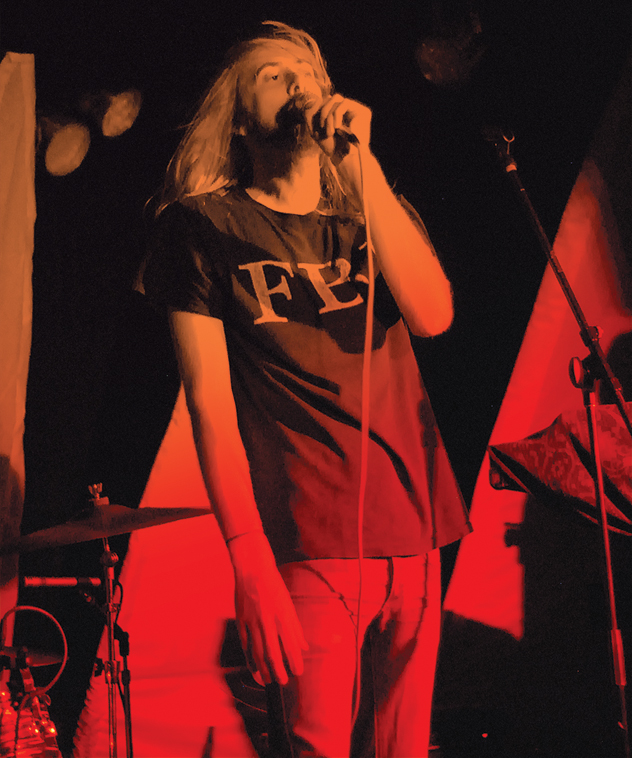
Then came the moment the now completely full house had been awaiting: Youth Lagoon assumed the position within an arc of giant canvas jaws lit up by a rainbow of colors, while exhalations of pink smoke seeped from between
the teeth.
Trevor Powers manned two stacked keyboards, adjacent to which was a tiny organ synthesizer. His touring band was made up of a guitarist, bassist and drummer, too, which sometimes rescinded into the background quietly to let the keys speak alone, to let Trevor sing softly.
Characterized as neo-psychedelia, Americana, indie rock and dream pop, Youth Lagoon’s genre-bending music dynamically transitions many times mid-song from calliope, to hymnal, to spacey, to driving, to noise—to pretty much anywhere on the spectrum of sound—seamlessly, skillfully and strategically, taking the listener on a journey through internal and external galaxies. Trevor beat his fists against his keyboards while playing restless arpeggios, and his band lifted the feet of the audience off the floor with climbing crescendos that culminated in eerie, cosmic plateaus. Then after carrying us across a starry expanse, Youth Lagoon cast us down cliffs, and we plummeted gladly in dramatic dirges before being hypnotically lifted up again.
Just as someone who’d nearly succumbed to submergence, Youth Lagoon left me feeling like I’d sunken into a deep, murky pool, struggled, panicked, gasped for breath—then, mercifully, a cloak of peace draped my consciousness and plunged me into a lucid euphoria. The bony fingers of death wrapped tighter and tighter around my throat until I was about to surrender…then let me go. It feels good to drown, and even better to live to tell about it.
Ganglians release a new double LP, Still Living
Forget rolling joints or slamming pills. Pop on a pair of headphones, shut your eyes and listen a while, and within minutes you are high as a kite. Meth huff? Easy. Coke snoot? No problem, just queue the track on your laptop. Wouldn’t it be nice if a high was as easy as paying 99 cents for an audio delivery of pure ecstasy?
In fact, the audio drug fad has recently caught media attention as parents debate whether or not “i-dosing” is in fact getting their children high. Communities in the Midwest have been particularly stressed about it, Ryan Grubbs, frontman of Sacramento’s psychedelic acid pop act Ganglians mentioned in a recent conversation with Submerge.
There was a sense of amusement in the way he described how genuinely terrified parents are by the thought their children might get hooked on ear-fed drugs. While the notion is laughable, the Montana native weighed in heavily on the effect music can have on the body, especially when it is delivered through headphones.
“We’re all guilty of listening to music on laptops and stuff,” he said.
But there is no musical experience that quite compares to an array of sounds streaming into each ear through a set of headphones, he added, creating a sort of vortex that almost feels paralyzing.
“There’s something about headphones [where] you can’t ignore the music, everything around you becomes part of the music rather than just being in the background.”
Rest assured, Ganglians are not looking to convert their listeners into junkies. Creating a setting, sometimes hallucinogenic or based on psychedelic experiences, however, plays a part in how the four band members (Grubbs, guitarist Kyle Hoover, drummer Alex Sowles and bassist Adrian Comenzind) write their songs.
Stereophonics, the encompassing delivery of sounds to each eardrum, is something that the four-piece has toyed with since the release of both their self-titled debut EP and full-length Monster Head Room in 2009.
Still Living, Ganglians’ next anticipated album via record labels Lefse and Souterrain Transmissions (in Europe), is no different.
The band released its first single, “Jungle,” in April 2011, accompanied by a tripped-out music video saturated with colors and Play-doh like prosthetics (which debuted in May), and quickly stirred an online buzz amongst music blogs and sites like Pitchfork and Fader. It was followed by the release of another single, “Sleep,” in July, made available for free download online.
The double LP comes out Aug. 23, 2011, giving Ganglians-lovers the chance to experience Still Living in its entirety. While Monster Head Room feels a bit more tribal and raw, Still Living is a dose of shimmering exultation, something like a joy ride. From the opening notes of “Drop the Act,” an anthemic call to arms to today’s apathetic youth, the album will keep listeners guessing from start to finish. Like Monster Head Room, it is peppered with subtle surprises–sounds of rain, panting, sirens, bats–staying true to the band’s ear-teasing tendencies. At the same time, Ganglians provides an album that’s more complex than its predecessors, venturing into R&B territory with “Things to Know,” a minimal composition of rumbling bass and Grubbs on vocals, and exploring heavier composition with the six-plus minute ballad “Bradley.”
Meanwhile, the band is preparing for their August tour, which starts along the West Coast on Aug. 10. Grubbs has been living in San Francisco, and with his return to Sacramento there is little time to waste being five months out of practice.
Still, this band is young, and jobs and living situations get in the way. Touring and putting out records was not something the band had expected during their early beginnings in the attic of a Sacramento house three-and-a-half years ago.
The fact that they have come this far by their mid-20s has been a surprise, or a “happy accident,” as Hoover put it.
Submerge spent an afternoon with three of the young four at Luigi’s Fungarden. Discussing the upcoming album, lo-fi and slacker-ism over beer, Sowles sat quietly while Grubbs and Kyle did most of the talking. The following is an excerpt from our conversation.

When I listened to Still Living I was feeling really elated. Do you have the same feeling when you’re playing your songs?
Ryan Grubbs: When we’re recording, there are moments of euphoria, and not necessarily dread, but uneasiness, uneasiness juxtaposed with euphoria. Yin and yang kind of stuff. Not trying to be too blissed out and not trying to be too depressed. It’s an album. You want people to experience a range of emotions.
Were any of the songs reflective of Sacramento living?
RG: Of course. And of people, and just day-to-day life. Struggles. First and foremost you’re trying to please yourself and experience yourself. And secondly you want to give your friends something. And then after that is the wide spectrum. You want everyone all and all, to find something there. You know, “Jungle”–it’s like the city of trees, it almost feels like a jungle but it’s kind of urban. “Sleep” is kind of about trying to escape day-to-day life by just sleeping, but then you have that voice in the back of your head that just throttles you out of it, like, “Hey, you got to make something. You can’t just like sit on the porch all day doing nothing.” They’re definitely reflective of the life living in Sacramento, for sure. I think that the whole ambiance of the album is very busy.
Alright, you can laugh at this question, but do you feel like your music represents your generation at all?
Kyle Hoover: In the sense of slacker-ism? There is a sense of underachievement, a little bit, every once in a while.
RG: Definitely. We are not trained musicians at all. We are not studio musicians. We just kind of picked up the instruments and tried to create what’s in our heads. But as far as this is music created for us, and for our friends, definitely. I mean that’s part of the reason I put “Drop the Act” in the beginning, because it’s kind of a half-hearted call to arms. Because I think I wrote the lyrics for that song after reading an article about the “twenty-somethings,” and I had never even thought about that point, but I thought, “Wow, they’re just choosing to drop out in bigger numbers than ever.” They just don’t want to be part of the system. They’re kind of just fed up with all the politics. They don’t want to participate at all. And that’s kind of what “Drop the Act,” the first song on the album, is just about not wanting to participate in that. And I think that a lot of people in our generation feel the same way.
When you guys are writing songs, how often are psychedelics part of your writing process?
RG: Never. Well just weed. The part that it is a process is in…
KH: Conceptualizing. Experiencing it and drawing from that experience and putting it in a song. But none of us ever get high and write music.
RG: Yeah, I tried it. “This is so amazing!” And then the next day, I was like, “What the fuck? Am I scratching a needle across the table?” But at the time it’s all-absorbing. There’s nothing else in the world that matters.
KH: I feel like as far as psychedelics influence goes in our music, it’s more constructing that feeling from your experience on psychedelics.
In a recent interview you expressed a desire to move away from the lo-fi garage scene and hope that Still Living accomplished that. Are you hoping to appeal to a different crowd?
KH: I don’t think we were ever trying to appeal to the lo-fi crowd in general. We never intended to be lo-fi. That’s why I get so mad when I read about that stuff in music journalism in general, because I feel like all these bands that we’re lumped in with and we sort of know, no one goes out of their way to make a bad-sounding record.
RG: I don’t know, there’s something that’s very rewarding about that kind of recording and I understand why I like lo-fi and why other people like lo-fi. There’s something about lo-fi, it’s just the perfect encapsulation of that moment you can’t tweak with. Whatever you have around you at the time, that’s what you’re going to do with it.
KH: But I think Monster Head Room was definitely intended to be a hi-fi record, it just wasn’t there. And then this was like, oh shit, we got the money and the studio to do it, let’s make a fucking clean record. A pop record. A meaningful pop record.
Still Living will be released through Lefse Records on Aug. 23. Go to Lefserecords.com for ordering information. You can check out Ganglians live at Luigi’s Fungarden on Aug. 10.


